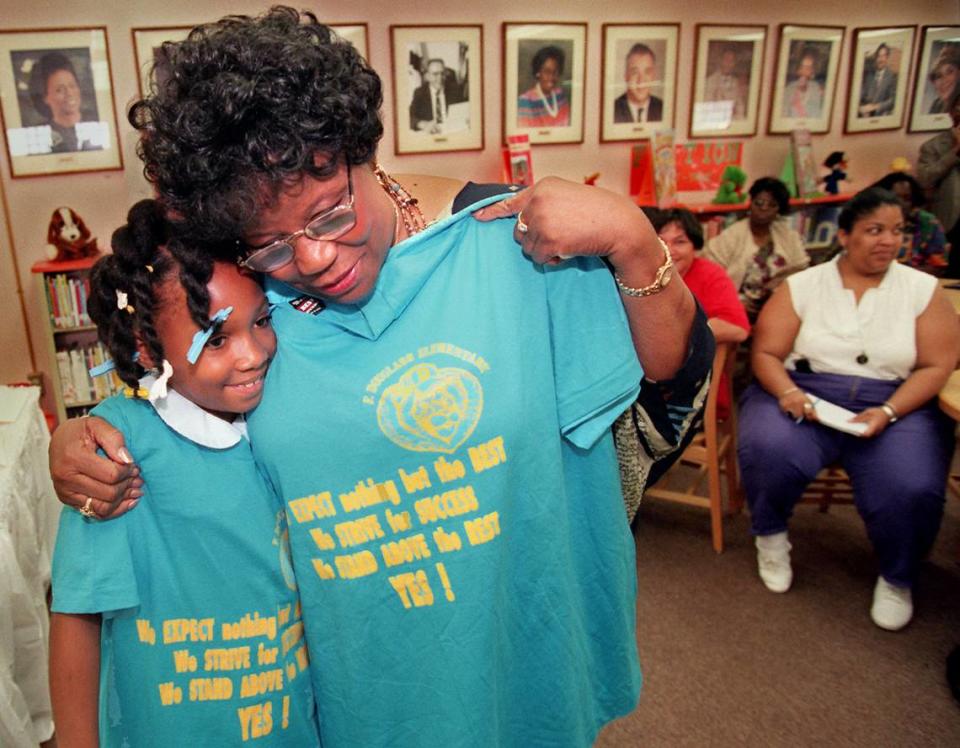Carrie Meek, pioneering Miami congresswoman and champion of Black communities, dies at 95
Former U.S. Congresswoman Carrie Pittman Meek, the first Black person to represent Florida in Congress since the post-Civil War Reconstruction and a fierce advocate for South Florida’s Black communities, Haitian immigrants and the working poor, died Sunday at her home in Miami after a long illness, her family said. She was 95.
Meek, said her daughter Lucia Davis-Raiford, had a “need to make sure her people, no matter where there were in the African diaspora, benefited from the benefits offered by being in the United States.”
The granddaughter of slaves, Meek served as Florida state representative, state senator and later became a congresswoman in 1992 at the age of 66. She won the nomination for the Democratic Party and ran unopposed in the general election, going on to win in one of three majority-Black districts in Florida that were reapportioned at the time.
She never lost a reelection to the U.S. House of Representatives before she retired in 2002 to devote her time, energy and influence to the Miami foundation bearing her name.
Meek’s tireless service and firebrand activism often revolved around the inequities she lived and witnessed as a Black woman growing up in a segregated Florida, and as an adult in predominately Black Liberty City during the 1980 riots that followed the acquittal of four white police officers in the killing of Arthur McDuffie, a Black insurance salesman.
Meek spoke out against the discrimination of Afro-Cubans by Cuba’s communist government, traveled to Ghana to celebrate the country’s independence and advocated for U.S. residence for Haitian immigrants, who made up a sizable portion of her north Miami-Dade district.

Gepsie Metellus, the founder of Sant La Haitian Neighborhood Center, said Sunday that Meek’s passing is like a sacred tree that has fallen.
“She is someone whose legacy is far reaching. Not just in the African American or Haitian American communities. But communities of color throughout the United States,” Metellus said. “Her story is that inspirational example that will stand the test of time.”
Meek, she said, was someone who worked hard, and was devoted and committed to her causes. She believed in not just enjoying success for herself, but the communities she served.
“She was one of the first champions of Haitian rights in this community, one of the first voices raised not just in Congress but at the State legislature, advocating for support for Haitian refugees in this community, the need for education for refugee children,” Metellus said. “She was always that voice shaming the legislature to do more and when she got to Congress, she continued it.”
Metellus remembers how after a meeting with Meek during which she guided Haitian community activists about the need for grassroots activism and the levers they needed to pull, the community came together and founded the Haitian-American Grassroots Coalition, an umbrella group that served as the backbone of activism for the plight of Haitian refugees in the U.S.
“She accompanied Haitian refugees on so many historic fights,” Metellus said, “and we won so many historic fights with her.”
Among those fights were to ensure that Haitian asylum seekers received the same legal rights as Central American immigrants after they were left out of asylum protections by sponsoring the Haitian Refugee Immigration Fairness Act in the mid-90s. Some 50,000 Haitian immigrants benefited from her legislation, which also had the support of Florida Republican lawmakers such as Rep. Lincoln Diaz-Balart and Sen. Connie Mack.
“When she took to the floor of Congress to advocate for the Haitian Refugee Immigration Fairness Act, she was unapologetic in her remarks that Haitians should have been included in [the Nicaraguan Adjustment and Central American Relief Act] and many Republicans, including Diaz-Balart joined her in support,” said Marleine Bastien, a Haitian and immigration rights activist.
Bastien called Meek “a mentor, a champion of human rights, a global icon.”
“Few voices were as loud, forceful and compassionate in the defense of equal treatment for Haitians,” she said. “We lost a giant.”
Months after arriving to Capitol Hill, she notably faced the recovery of Hurricane Andrew in the early 1990s, which had devastated much of south Miami-Dade County. As a member of the powerful House Comittee on Appropriations, Meek helped to secure $100 million in aid to rebuild Dade as it recovered from a devastating Andrew.

Former U.S. Rep. Ileana Ros-Lehtinen, who served in the Florida Senate and in U.S. Congress with Meek, was one of several South Florida Republicans Meek befriended and worked with on bipartisan legislation during her time in D.C..
“Carrie was an indefatigable fighter for justice and we were blessed to have her with us for so long,” Ros-Lehtinen told the Herald in a statement on Sunday evening. She said she heard the news about Meek’s passing from her son Kendrick, whom she said she was partnering with to tape a video tribute for Meek so it could be played during her services.
“I am honored that he wanted me to be part of that testimony. Carrie was one of a kind. A true fighter. A gifted orator. A tremendously positive influence in our community,” Ros-Lehtinen added.
Daughter of sharecroppers
The daughter of Willie and Carrie Pittman, Meek was born April 29, 1926 in segregated Tallahassee. Meek’s parents were sharecroppers. Her father later became a caretaker and her mother was a laundress and owned a boarding house. They both raised her during the turbulent Jim Crow era, and she would go onto break many racial, gender, and educational barriers to earn a B.S. in Biology and Physical Education from Florida A&M University in 1946.
Meek’s son, former U.S. Rep. Kendrick Meek, who succeeded her in representing what was then Florida’s Congressional District 17, recalled in a 2019 archival interview with the U.S. House of Representatives the impact of his mother’s early childhood on her life.

She would tell the story of being a Girl Scout and baking brownies with her troop to give out to state legislators, only to be barred from the Capitol because she was Black. She couldn’t walk past the sidewalk and the sergeant at arms would pick up the brownies from the Black Girl Scouts, as the white troop members walked past them into the Capitol, the same building she would later navigate as the first Black woman state senator in Florida.
“She shared those experiences with me to make sure that I was well-rooted and understood the Black experience in Florida,” Kendrick Meek said in the 2019 interview. “She, in many ways, was able to use those experiences to provide context to her work as a policymaker, and that’s what, I think, made her such a powerful change-maker.”
Meek told the Washington Post in an in interview in 1992 that as a child, she couldn’t try on shoes in stores because she was Black. There weren’t any decent recreational facilities to enjoy for Black folks. And even as she soared in sports as a track & field athlete, she was not allowed to pursue a master’s degree in her home state of Florida after graduating from Florida A&M University.
She went to the University of Michigan, where she earned a master’s in physical education and public health two years later.
After earning her master’s degree, Meek went on to become an educator at different institutions throughout Florida, including at Bethune-Cookman University, the historically Black university in Daytona Beach. She became its first female basketball coach. Later, she joined Miami-Dade College, where she became its first Black professor, associate dean, and assistant to the vice president from 1961 to 1979.
Miami-Dade College President Madeline Pumariega said the school mourns the loss of its beloved icon who elevated the community and nation, and is grateful for her many contributions.
“She was a legendary trailblazer who paved the way for so many women and minorities to lead and serve at the state and national levels,” Pumariega said, adding that a memorial service will take place at the North Campus later this week.
Theo Karantsalis, 60, who served as a longtime librarian and professor at Miami Dade Community College’s Carrie P. Meek Entrepreneurial Education Center in Liberty City, noted the congresswoman’s legacy at the school, where she made educating inner-city youth a priority.
“Students looked to her as a mentor and a hero, one who stood at the ready to fight the good fight. May God rest her soul,” Karantsalis said.
Meek was the mother of three children: Lucia Davis-Raiford, Sheila Davis and Kendrick Meek. Sheila Davis described her once to the Washington Post as “funny and warm and friendly” but also “very tough.”
“She had to be,” said Davis.
Never backed down in debates
Meek was an unapologetic Democrat who sided with her party on most liberal issues but sometimes sided with Republicans, too, like opposing cuts to the U.S. military or on normalizing relations with Cuba. And she never shied away from a confrontation over her legislative priorities.
While serving in the Legislature, Meek regularly intensified floor debates, once threatening to camp out on the doorstep of a colleague who was reluctant to increase funding for Jackson Memorial Hospital.

And if she thought a particular bill needed to be killed, she waved a black flag adorned with a skull and crossbones, declaring the measure needed to be “black-flag dead,” a term she popularized.
As much as it didn’t matter what issue she debated, it also didn’t matter who she was debating against.
In 2002, as then-Gov. Jeb Bush campaigned in Miami with Black lawmakers during his re-election bid, Meek confronted him over the detainment of 211 Haitian migrants who had reached South Florida on a raft at the time. She called the arrests discriminatory and asked for Bush to call his brother, then-President George Bush, and demand for Haitians to be treated the same as Cuban migrants seeking asylum.
And once, fresh out of her first reelection to Congress, Meek provoked a massive argument on the floor of the House of Representatives when she chided the House Speaker at the time, Newt Gingrich, for allegedly negotiating a multi-million dollar book deal with a publishing company that had a big stake in telecommunications legislation at the time. Meek said of the potential money Gingrich stood to gain as “a whole lot of dust where I come from.”

The uproar that ensued from Meek’s speech, which Republicans later struck partly from the Congressional Record because they claimed it violated rules of propriety, made front pages in The New York Times, the Washington Post and TV news. “The only thing missing up here is my black flag,” she told the Herald about the episode, with a wide smile.
While in the House, Meek focused her attention on issues such as economic development, healthcare, education and housing. In her first term in Congress, she sponsored and passed a measure providing Social Security benefits for nannies and day laborers. After Hurricane Andrew, she also joined the fight to rebuild what had been Homestead Air Force Base.
Meek also led legislation through Congress to improve Miami-Dade County’s transit system, construct a new family and childcare center in North Miami-Dade, and fund advanced aviation training programs at Miami-Dade Community College. In 2001, she founded the Carrie Meek Foundation to provide the Miami-Dade community with much needed resources, opportunities and jobs and spearheaded its daily operations until 2015 when she stepped down due to declining health.
In recognition of her distinguished and trailblazing career, Meek was awarded honorary doctor of law degrees from the University of Miami, Florida A&M, Barry University, Florida Atlantic University and Rollins College. Her name is emblazoned on several buildings including Florida A&M’s James N. Eaton Sr. Southeastern Regional Black Archives Research Center and Museum in Tallahassee; and Broward County’s Nova Southeastern College’s Outstanding Education Leadership Achievement scholarship and Miami’s Northwest 27th Boulevard.
In addition to her children and their spouses, she is survived by a host of grand children, great-grandchildren, family and friends. Services will be announced at a later date.
Miami Herald Writer C. Isaiah Smalls II contributed to this story.

 Yahoo Finance
Yahoo Finance 